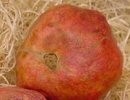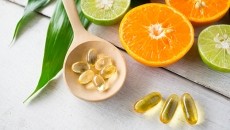Study questions pomegranate supplement standardization

Researchers at the University of California tested 27 pomegranate supplements in the form of capsules, tablets and softgels to determine their phytochemical profiles beyond their content of ellagic acid.
Their findings, published in the Journal of Agricultural and Food Chemistry, demonstrated that ellagic acid alone does not represent pomegranate polyphenols. Furthermore, the addition of ellagic acid from other less expensive sources could be misleadingly boosting the perception of antioxidant activity without increasing tannin levels, said the researchers.
Antioxidant activity
Hydrolyzable tannins (punicalin and punicalagins) are a key indicator of antioxidants, thought to account for almost 90 percent of the antioxidant activity of pomegranate juice.
These tannins are hydrolyzed in the intestinal tract and lead to sustained blood levels of ellagic acid. The ellagic acid is then metabolized to urolithins, which are also thought to account for some of the biological activities associated with pomegranate juice or extract consumption.
However, it is the content of ellagic acid which is largely used as the chemical marker for the commercial standardization of pomegranate supplements.
The researchers tested the commercial supplement products chosen for the study to determine total polyphenol content, using both gallic acid equivalent (GAE) and ellagic acid equivalent (EAE) assays.
Punicalagins, punicalin, and ellagic acid contents were determined by HPLC, whereas antioxidant capacity was measured using the Trolox equivalent antioxidant capacity (TEAC) assay.
No authenticity guarantee
“Of the 27 supplements tested, only five had the typical pomegranate tannin profile by HPLC, 17 had ellagic acid as the predominant chemical with minor or no detectable pomegranate tannins, and five had no detectable tannins or ellagic acid,” said the researchers.
“Therefore, standardization of pomegranate extract supplements based on their ellagic acid content does not guarantee pomegranate supplement authenticity.”
In addition, they highlighted that this method of standardization means that supplements can be adulterated with ellagic acid from less expensive sources, such as chestnut bark.
David Winston, president and founder of extract supplier Herbalist & Alchemist, agreed that this type of adulteration occurs in the supplements industry. “Many companies buy raw materials from the least expensive source, but are they really getting what they think they are getting?” he said.
“It is very important to know the supplier of raw material, especially with powders. Adequate botanical ID and chemical testing (if organoleptic testing is not adequate) are essential. (…) Having a C of A is not enough. Reputation and careful quality control are the hallmarks of reputable and reliable suppliers and manufacturers,” said Winston.
President and COO of pomegranate extract supplier Cyvex, Matt Phillips, said the data in the study does not demonstrate that the pomegranate extracts standardized for ellagic acids were adulterated with ellagic acid from other sources.
“For the pomegranate extracts standardized for punicalagins, TLC identification might be used as an identity test. For extracts standardized for ellagic acid, identification of the source is much more difficult and this might be an area which needs future work,” he said.
The researchers concluded that more research is needed to assess the health impact of substituting ellagic acid for the complex mix of phytochemicals in a pomegranate extract dietary supplement.
Source: ‘Absence of Pomegranate Ellagitannins in the Majority of Commercial Pomegranate Extracts: Implications for standardization and Quality Control’
Journal of Agricultural and Food Chemistry
Doi:10.1021/jf9010017
Authors: Yanjun Zhang, David Wang, Ru-Po Lee, Susanne Henning, David Heber












